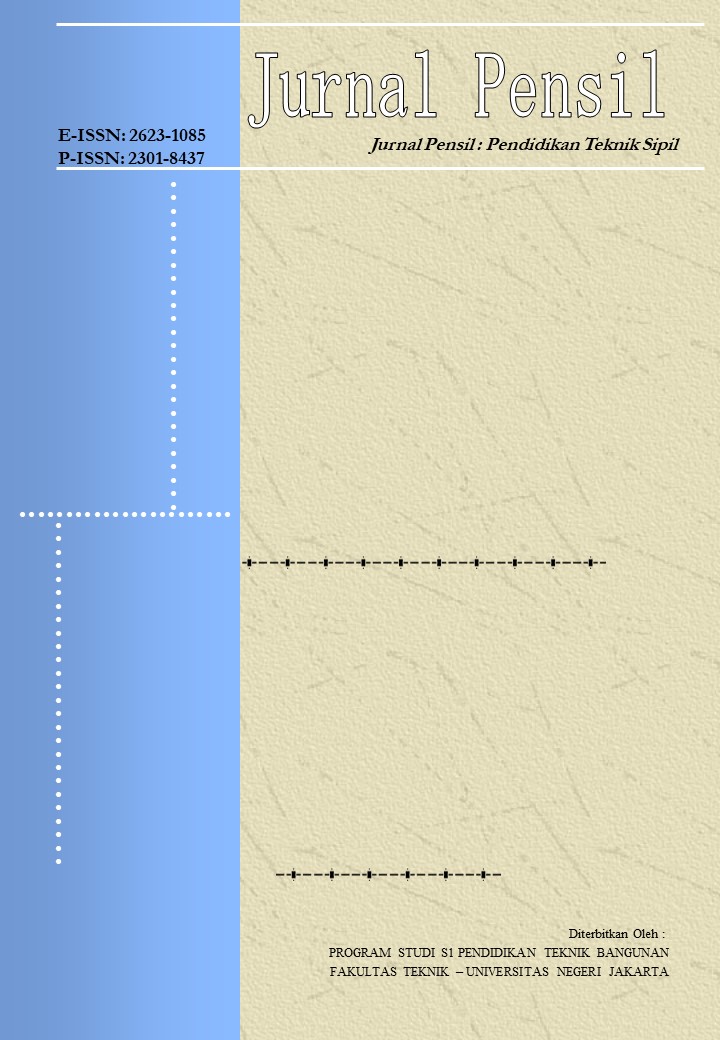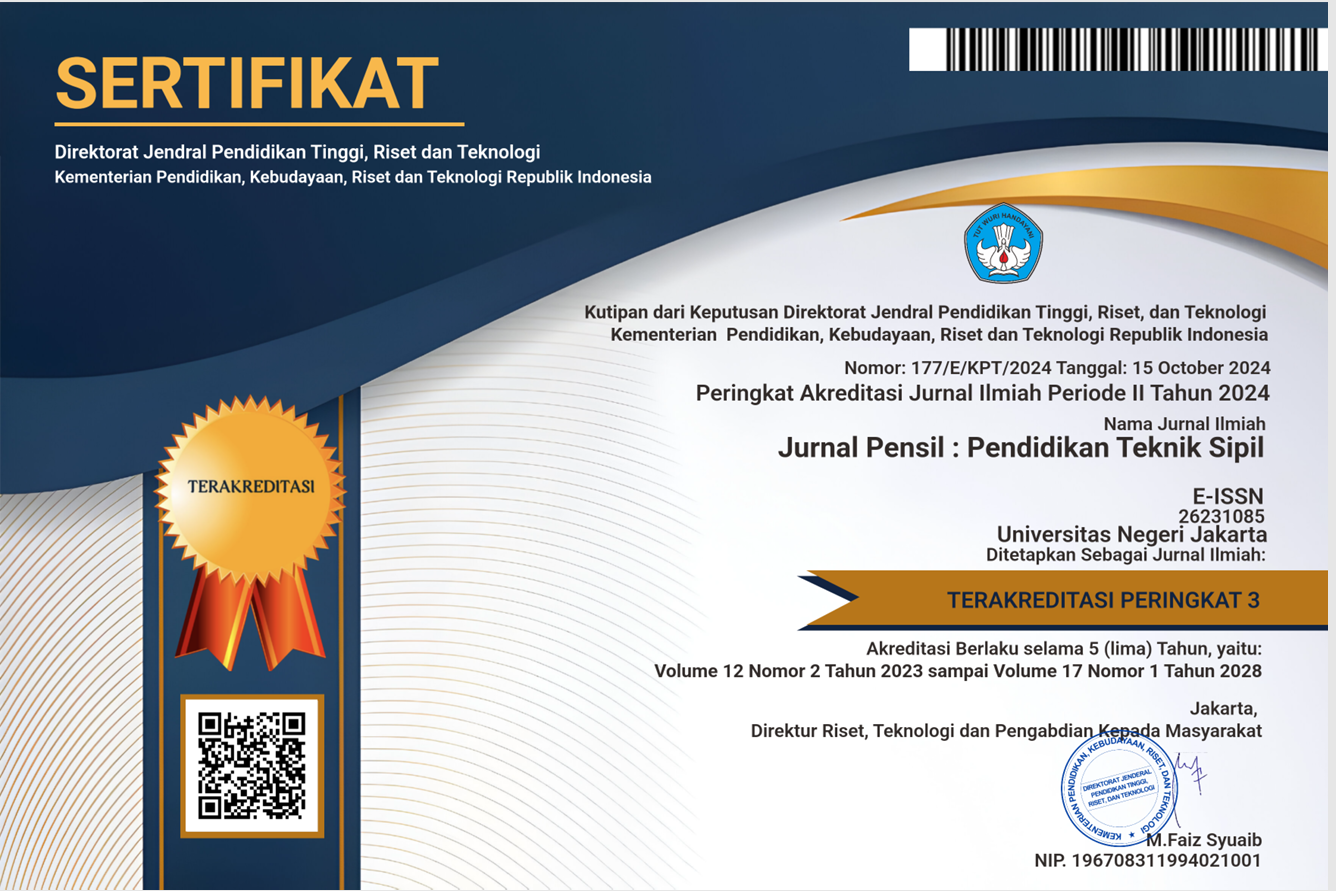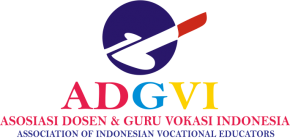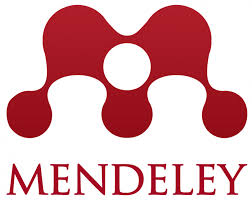DEVELOPMENT OF ENRICHED VIRTUAL CLASSROOM WITH PEDATI IN CONSTRUCTION COST ESTIMATE COURSE
DOI:
https://doi.org/10.21009/jpensil.v12i2.34941Keywords:
ADDIE, PEDATI, Enriched Virtual ClassroomAbstract
This study aims to develop designs and learning products for the Enriched Virtual Classroom using PEDATI in building construction planning. Enriched Virtual Classroom belongs to blended learning. This learning model is one of the models where the learning process is played with technology and face-to-face learning is only an additional supplement if needed. The development procedure uses the ADDIE model which is integrated with the PEDATI model at the learning design preparation stage. The components and indicators for the expert review of the instrument were prepared based on the standard components and indicators of the "Network-Based Learning Evaluation Instrument" developed by Hadiansyah, et al. in 2018. Instruments will be given to learning design experts in terms of five aspects, namely subject identity, clarity of learning objectives, the relevance of learning strategies to learning objectives, the relevance of evaluation to learning objectives as well as language and communication. The results of the evaluation use the scoring from the expert review by using proportions. The percentages obtained were 94.78% from instructional design experts, 95.71% from media experts, and 90.83% from instructional design experts.
References
Arciosa, R. M. (2022). Information Communication Technology (ICT)-Based Instructional Softwareand Its Effectiveness in Teaching High School Geometry. Indonesian Journal of Teaching in Science, 2(1). https://doi.org/10.17509/ijotis.v2i1.45271
Asino, T. I., Colston, N. M., Ibukun, A., & Abai, C. (2022). The Virtual Citizen Science Expo Hall: A Case Study of a Design-Based Project for Sustainability Education. Sustainability (Switzerland), 14(8). https://doi.org/10.3390/su14084671
Avsec, S., Jagiełło-Kowalczyk, M., Zabicka, A., & Trinova, Z. (2022). Enhancing Transformative Learning and Innovation Skills Using Remote Learning for Sustainable Architecture Design. Sustainability (Switzerland), 14(7). https://doi.org/10.3390/su14073928
Az-Zahra, H. M., Dini, N., & Herlambang, A. D. (2022). User Experience in Learning Management System: Edmodo versus Google Classroom. Journal of Information Technology and Computer Science, 7(3), 196–208. www.jitecs.ub.ac.id
Chaeruman, U. A., Wibawa, B., & Syahrial, Z. (2020). Development of an Instructional System Design Model as a Guideline for Lecturers in Creating a Course Using Blended Learning Approach. International Journal of Interactive Mobile Technologies, 14(14), 164–181. https://doi.org/10.3991/ijim.v14i14.14411
Cronje, J. C. (2020). Towards a New Definition of Blended Learning. Electronic Journal of E-Learning, 18(2), 114–135. https://doi.org/10.34190/EJEL.20.18.2.001
Dakhi, O., Jama, J., Irfan, D., Ambiyar, & Ishak. (2020). Blended Learning: a 21st Century Learning Model At College. International Journal of Multi Science, 1(2), 17–23.
Dewi Harahap, S., Jimmi, J., Jacob Pattiasina, P., Trinova, Z., & Damayanto, A. (2022). Trends in Technological Innovation in Education During a Time of Pandemic Disruption: Examining The Perspective of Teaching Digital Pedagogy. Nazhruna: Jurnal Pendidikan Islam, 5(1), 37–50. https://doi.org/10.31538/nzh.v5i1.1867
Farman, Hali, F., & Karman. (2022). Development of Edmodo Media with Learning Videos to Improve Understanding and Mathematical Resilience on Derivative Material. AL-ISHLAH: Jurnal Pendidikan, 14(4), 6457–6468. https://doi.org/10.35445/alishlah.v14i4.2154
Fatahillah, A., & Triyono, M. B. (2019). Graduate’s Perception on the Importance of Special Job Market in State Vocational High Schools in Langsa City. Jurnal Pendidikan Vokasi, 9(2), 197–206. https://doi.org/10.21831/jpv.v9i2.26361
Ismail, D. H., & Nugroho, J. (2022). Kompetensi Kerja Gen Z di Era Revolusi Industri 4.0 dan Society 5.0. JIIP-Jurnal Ilmiah Ilmu Pendidikan, 5(4), 1300–1307.
Krismadinata, Verawardina, U., Jalinus, N., Rizal, F., Sukardi, Sudira, P., Ramadhani, D., Lubis, A. L., Friadi, J., Arifin, A. S. R., & Novaliendry, D. (2020). Blended Learning as Instructional Model in Vocational Education: Literature review. Universal Journal of Educational Research, 8(11B), 5801–5815. https://doi.org/10.13189/ujer.2020.082214
Kulal, A., & Nayak, A. (2020). A Study on Perception of Teachers and Students Toward Online Classes in Dakshina Kannada and Udupi District. Asian Association of Open Universities Journal, 15(3), 285–296. https://doi.org/10.1108/aaouj-07-2020-0047
Lalian, O. N., Siregar, E., & Winarsih, M. (2021). Blended Learning for Vocational High School Students. Kwangsan: Jurnal Teknologi Pendidikan, 9(1), 18. https://doi.org/10.31800/jtp.kw.v9n1.p18--30
Lasamahu, B. (2021). Pengembangan Pembelajaran Online Dengan Pendekatan Project Based Learning Pada Mata Kuliah Teknologi Kinerja di PPs UNJ.
Lutfiana, R. N. D., Siregar, E., & Winarsih, M. (2022). Teacher Innovation to Facilitate Student Learning Experiences in Building Construction Cost Estimation Learning. Journal of Education Research and Evaluation, 6(2), 255–263. https://doi.org/10.23887/jere.v6i2.44299
Mahmud, R. (2020). Blended Learning Model Implementation in the Normal, Pandemic, and New Normal Era. Proceedings of the 5th Progressive and Fun Education International Conference (PFEIC 2020), 479(Pfeic), 130–139.
Maydiantoro, A. (2021). Research Model Development: Brief Literature Review. Jurnal Pengembangan Profesi Pendidik Indonesia, 1(2), 29–35.
Nofrita, M., & Idrus, A. (2022). Entrepreneurship Education to Shape The Character Of Vocational Students in Facing The Challenges of 4.0 Era. https://erudio.ub.ac.id
Penjor, T., Utha, K., & Seden, K. (2022). Effectiveness of Simulation in Teaching Geometrical Optics. International Journal of English Literature and Social Sciences, 7(5), 088–094. https://doi.org/10.22161/ijels.75.16
Pivneva, S., Vitkovskaya, N., Makarov, O. N., & Dobrova, K. B. (2020). Integration Of Network Capabilities Of Blended Learning. Journal of Chemical Information and Modeling, 53(9), 1689–1699.
Prasetyo, D., Wibawa, B., & Musnir, D. N. (2020). Development of Mobile Learning-Based Learning Model in Higher Education Using the Addie Method. Journal of Computational and Theoretical Nanoscience, 17(2), 911–917. https://doi.org/10.1166/jctn.2020.8740
Ratnaningsih, S., Miswan, Hady, Y., Sari Dewi, R., Fahriany, & Zuhdi, M. (2020). The Effectiveness of Using Edmodo-Based E-learning in the Blended Learning Process to Increase Student Motivation and Learning Outcomes. 2020 8th International Conference on Cyber and IT Service Management, CITSM 2020. https://doi.org/10.1109/CITSM50537.2020.9268924
Undang-Undang Nomor 20 Tahun 2003 Tentang Sistem Pendidikan Nasional, (2013).
Rofiah, M. D., & HS, M. S. (2021). Studi Tentang Model dan Media Pembelajaran Pada Mata Pelajaran Estimasi Biaya Konstruksi di SMK. Jurnal Kajian Pendidikan Teknik Bangunan (JKPTB), 7(2).
Romadloni, M. R., & Cahyaka, H. W. (2021). META – Analisis Pengaruh Media Pembelajaran Terhadap Hasil Belajar Mekanika Teknik Siswa SMK. Jurnal Kajian Pendidikan Teknik Bangunan, 7(1).
Setiawan, A. A., Muhtadi, A., & Hukom, J. (2022). Blended Learning and Student Mathematics Ability in Indonesia: A Meta-Analysis Study. International Journal of Instruction, 15(2), 905–916. https://doi.org/10.29333/iji.2022.15249a
Spatioti, A. G., Kazanidis, I., & Pange, J. (2022). A Comparative Study of the ADDIE Instructional Design Model in Distance Education. In Information (Switzerland) (Vol. 13, Issue 9). MDPI. https://doi.org/10.3390/info13090402
Sudarsana, I. K., Nakayanti, A. R., Sapta, A., Haimah, Satria, E., Saddhono, K., Achmad Daengs, G. S., Putut, E., Helda, T., & Mursalin, M. (2019). Technology Application in Education and Learning Process. Journal of Physics: Conference Series, 1363(1). https://doi.org/10.1088/1742-6596/1363/1/012061
Sudarsono, B., Tentama, F., Mulasari, S. A., Sukesi, T. W., Sulistyawati, Ghozali, F. A., Yuliansyah, H., Nafiati, L., & Sofyan, H. (2022). Development of Integrated Project-Based (PjBL-T) Model to Improve Work Readiness of Vocational High School Students. Jurnal Pendidikan Vokasi, 12(3), 222–235. https://doi.org/10.21831/jpv.v12i3.53158
Sugiyono. (2015). Metode Penelitian & Pengembangan untuk Bidang: Pendidikan, Manajemen, Sosial, Teknik. Alfabeta.
Sugiyono. (2017). Metode Penelitian Kombinasi. Alfabeta.
Suharno, Pambudi, N. A., & Harjanto, B. (2020). Vocational Education in Indonesia: History, Development, Opportunities, and Challenges. Children and Youth Services Review, 115(May), 105092. https://doi.org/10.1016/j.childyouth.2020.105092
Sunggoro, S., Ulfiah, Farouq Ghoer, H., & Kosasih, U. (2022). Factory Learning Management in Growing The Entrepreneurship of Vocational School Students in Karawang District (Case Study at SMK Rismatek Karawang and SMK Lentera Bangsa Karawang). Journal of Industrial Engineering & Management Research, 3(3). https://doi.org/10.7777/jiemar.v2i3
Tegeh, I. M., Jampel, I. N., & Pudjawan, K. (2014). Model Penelitian Pengembangan. Graha Ilmu.
Widiyono, A., & Millati, I. (2021). Peran Teknologi Pendidikan dalam Perspektif Merdeka Belajar di Era 4.0. In JET: Journal of Education and Teaching (Vol. 2, Issue 1).
Wulandari, S. A. (2022). Konsep dan Aplikasi Literasi Baru di Era Revolusi Industri 4.0 dan Society 5.0.
Yehia, S., & Gunn, C. (2018). Enriching the Learning Experience for Civil Engineering Students through Learner-Centered Teaching. Journal of Professional Issues in Engineering Education and Practice, 144(4). https://doi.org/10.1061/(ASCE)EI.1943-5541.0000388











.png)
.png)
1.png)

